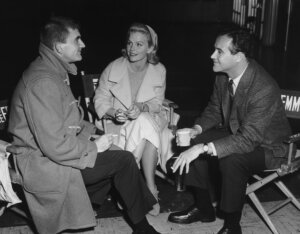An heir to Broadway royalty returns to the Great White Way with an unlikely musical
Adam Guettel’s adaptation of ‘Days of Wine and Roses’ is a story of love and addiction

Brian d’Arcy James and Kelli O’Hara in Days of Wine and Roses. Photo by Joan Marcus
It started life as a teleplay. Then it became a film that earned its stars Lee Remick and Jack Lemon Oscar nods. Now, it lives again in what at first may seem its least likely incarnation: Days of Wine and Roses — the musical.
The story of a couple’s descent into alcoholism is not the stuff typical Broadway musicals are made of. But somehow composer Adam Guettel and the play’s book writer, Craig Lucas pull it off. (The two worked previously together on the Tony Award-winning The Light in the Piazza.) The show earned excellent notices during a brief off-Broadway run last summer before its transfer to Studio 54, where it will be ensconced at least through the end of April.
The project has been more than two decades in gestation, and began with a conversation Guettel had with Kelli O’Hara, one of Wine and Roses’ stars (along with Brian D’Arcy James).
“We were working together on a workshop of Light in the Piazza about 21 years ago,” Guettel told me over Zoom. “We started talking about the movie. We both loved it. I remember remarking that she looked like Remick. So Kelli and I sort of hatched the idea together.”
But time passed, and it wasn’t until a decade later that he got the rights and started work on it. He worked first with John Logan, the respected playwright and screenwriter, but “it turned out after a little time together, he just wasn’t feeling it. It wasn’t a good fit for him.” Ultimately, he reunited with Lucas, who, Guettel contends, has written the literary equivalent of arias “as musical as my songs.” The script isn’t preachy, he says. “This isn’t a cautionary tale or a morality play. It’s a love story about two people deeply in love who are torn apart by addiction.”
Guettel has spoken before of his own battles with addiction and how it informed his music here. “It was a scary time and it was very helpful in writing this show,” he said. Recalling his personal battles, he said he wanted to portray the couple in the show not as winners or losers but as humans who have all the joys and frailties associated with that condition.
This dualism is a theme he’s explored before, in his first musical, Floyd Collins. It ran only briefly off-Broadway but established Guettel’s reputation as, in the words of a New York Times critic, “a young composer of strength and sophistication.”
Collins was a spelunker who a century ago explored Kentucky caves hoping to find one that might attract paying tourists. He found what he thought fit the bill, Sand Cave, but while exploring it, he became trapped and eventually died when rescuers failed to reach him in time.

“These plays may diverge from what one would think of as a Broadway musical, or certainly a musical comedy. But these stories have a lot of struggle in them, and they also have what struggle buys, the right to have an almost ecstatic happiness,” said Guettel. “These two things pair very nicely. In Floyd’s case, he was ecstatic, and in love with the idea of having discovered something incredible, which he did just before he died. Something no one had ever seen before, and he had time to enjoy it before he gets trapped. It’s a balance.
“In the case of Days of Wine and Roses, there’s a great ecstatic and romantic first arc. Then, as the narrative goes along, they (the couple) are good, they’re not good, this one’s good, that one’s not good — it sounds extra Jewish, doesn’t it? There is creative energy in that environment.”
Guettel is fortunate here in that he had significant talent to write for, particularly O’Hara, whose voice and range is operatic. There are several soaring anthems in the musical, giving everyone — composer and singers — an opportunity to show off. Other songs are more conversational in nature, almost soliloquies. The varying styles make Guettel’s music difficult to categorize.
“No one, in my experience, who is writing songs for the American theater has quite his deep understanding of what drives characters to sing, or how music functions in the theater,” Lucas told Bostonia. “It’s almost something that exists in him on a cellular level. He’s writing chromatic music [where] there is rarely a key signature, and he’s moving within key signatures from bar to bar. Someone who’s playing three-way chess every move has an impact on the game beneath it.”
Still, it’s been 20 years since he had his own show on Broadway. I asked if he ever worried about whether he’d ever have another Broadway production. “So much,” he replied, before quickly adding that he hadn’t exactly been idle. He has written a musical, Millions, based on the Danny Boyle movie of the same name, and almost completed a musical based on The Princess Bride, which got bogged down in a dispute over royalties (“I still have the score and plan to repurchase it, he said”). He also wrote incidental music for To Kill a Mockingbird (earning a Tony nod) and Uncle Vanya.
“But it’s understandable if people think I didn’t do anything because I disappeared like that. But I’m happy as long as I get the pieces I’ve written heard on stage. To connect to what you rightly say, my work [can be] a little jarring, a little unexpected. Not always what people generally go to the theater for. But so far, maybe I’m threading a needle. Maybe I’m just stepping on a rake. But you know at least I got them on, they got done,” he said.

Raised on the Upper West Side of Manhattan, Guettel is the son of Mary Rodgers, who wrote Once Upon a Mattress and the Freaky Friday books and films, and Henry Guettel, president of the Theater Development Fund. His grandfather was Richard Rodgers, who with Oscar Hammerstein changed American musical theater.
“We were secular Jews,” Guettel said. “Or in the case of my parents, Jews when that was useful.”
He claims his parents took pride in wrangling their way into places that were normally restricted, places where young Adam “felt extremely uncomfortable.”
“I am certainly and very happily being identified as Jewish, and not just according to Jewish law because my mother is Jewish. But also because I believe so deeply in solidarity,” Guettel said. “It’s a very tough time in our country right now. We don’t have to go into what is going on, but I feel my identity even more intensely right now.”
As a child, he was a gifted singer who worked professionally with the New York City and Metropolitan operas. He played bass in a series of bands, starting in high school, and even tried acting, but discovered he wasn’t that good at it. “It’s good to be told in no uncertain terms that you suck, because then you can move on,” he said.
But composition always drew him. I asked whether he ever felt his heritage was a burden.
“My grandfather was only very supportive and lovely to me,” he said. “He died when I was about 15. My mother had high expectations. Not that I should be bringing home truckloads of cash or of necessarily becoming famous, but she had very strong and strictly enforced expectations about my quality as a writer. She was like, be good or be boring. You know? She was very clear about it.”
I asked Guettel whether he felt his career was beshert.
He said he wasn’t familiar with the word, so I suggested that it was written in the stars.
“I think all of us are written in the stars. But I always knew I wanted to be making music,” he said.
Correction: An earlier version of this article misstated the name of the magazine in which Lucas was quoted. It is Bostonia, not The Bostonian.




















